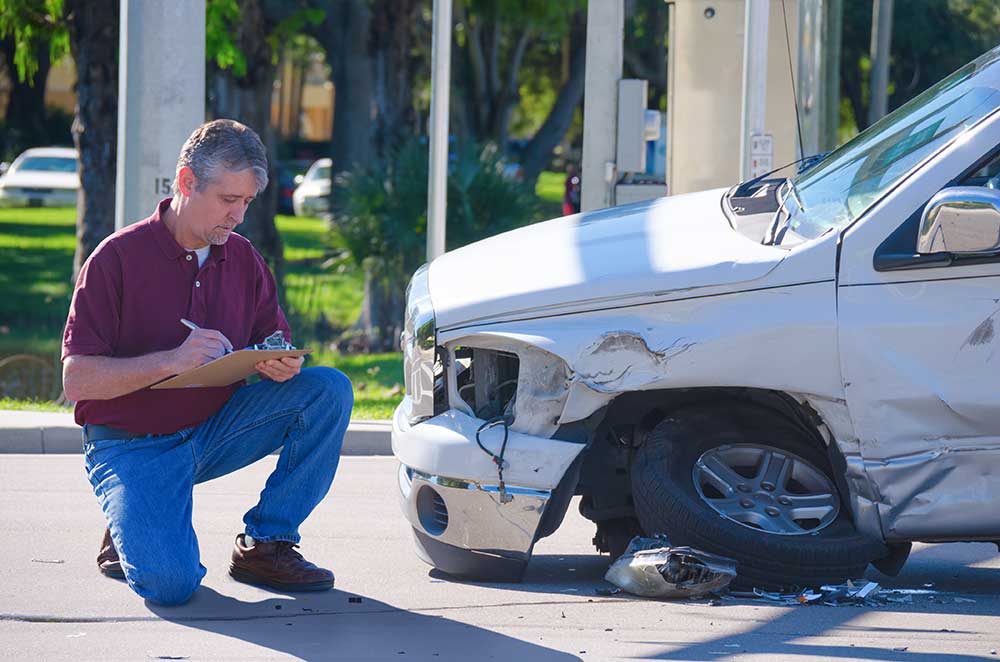Disclaimer: The information on our website is provided for general information purposes only. We make no representations or warranties of any kind, express or implied, about the completeness, accuracy, reliability, suitability or availability with respect to the website or the information contained on our website for any purpose. Any reliance on such information is therefore strictly at your own risk and we are not liable for any damages or losses arising out of or resulting from your reliance on any information contained on our website.
A claims adjuster inspects damage to property. For example, they inspect automobiles, homes, or businesses to determine how much financial obligation an insurance company has. Because of this, they work for insurance companies and generally travel to the damaged property to inspect it. They may also be tasked to provide surveillance for the insurance company within their community or residing state. Watch a video as a claims adjuster shares her experience:
How to Become a Claims Adjuster

Claims adjusters need a minimum of a high school diploma and then can get on-the-job training. However, employers often seek candidates with associates or bachelor’s degree in business, accounting, or related area. Also, some states may require you to become licensed and require you pass an exam. Bear in mind you’ll also need a driver’s license to travel to locations to access damage. Be sure to research your state’s requirements to find out more details.
Claims adjusters have several benefits, but freedom to choose who you work for and what assignments to accept is one of them. Some adjusters also have the ability to work from home and others enjoy traveling to different locations for work. This flexibility can keep the job from getting boring.
Job Description of a Claims Adjuster
Claims adjusters have a variety of tasks depending on the type of insurance company they work for, but typically investigate, evaluate and settle insurance claims. They research the insurance policy to find out the amount the insurance company should pay. They conduct surveillance to ensure the claims are not fraudulent and may even look at police reports.
A claims adjuster would need to contact the doctor’s or employer of the claimant on questionable claims and may confer with legal counsel if necessary. They are the ones that negotiate settlements and authorize payments on the insurance company’s behalf. They must have a thorough knowledge about what their company insures. For instance, they would need to understand housing and construction costs to evaluate fire or flood damage if their company carries property and casualty insurance. In the case of health insurance one must have the ability to determine what types of treatments are needed and which are questionable.
Claims adjusters work in offices or are out in the community investigating, gathering information, or speaking to individuals face to face or by telephone that are involved in the claim. Adjusters typically work 40-50 hours and work loads can be stressful at times. Most work for insurance companies or act as independent contractors. There is a slower than average growth rate projected by the Bureau of Labor Statistics for this occupation, however they project that this may change especially with the aging population and health insurance changes. More and more medical insurances are beginning to look for claims adjusters for medical disputes.
Claims Adjuster Career Video Transcript
When natural disaster strikes, or a car accident happens, insurance professionals are called in to help start putting the pieces back together. When people have an insurance policy for their health, home, or car, and they become injured or their property is damaged, they make a request, called a claim, for payment to cover their costs. Claims adjusters, appraisers, examiners, and investigators evaluate insurance claims, to decide whether an insurance company must pay a claim, and if so, how much.
Appraisers estimate the cost or value of an insured item. Most are auto damage appraisers. They inspect damaged vehicles and estimate the cost of repairs. Adjusters inspect damaged real estate properties and automobiles to determine how much the insurance company should pay for the loss. They gather evidence and report it to examiners. Adjusters negotiate with the policyholder to arrive at a final payment amount for their claim.
Claims examiners review claims to ensure guidelines are followed properly. They review health-related claims to determine whether to pay, deny, or refer a claim to an investigator. Insurance investigators handle potentially fraudulent claims or suspected criminal activity such as arson, staged accidents, or unnecessary medical treatments. Claims adjusters, examiners, and investigators spend time in the office, and out in the field to inspect damaged properties.
Auto damage appraisers spend much of their time at automotive body shops to estimate repair costs. Entry-level claims adjusters, examiners, and investigators need a high school diploma or equivalent. Auto damage appraisers require either a certificate in the field, or work experience estimating the cost of car repairs.
Article Citations
Bureau of Labor Statistics, U.S. Department of Labor, Occupational Outlook Handbook, Claims Adjuster.
The career video is in the public domain from the U. S. Department of Labor, Employment and Training Administration.

